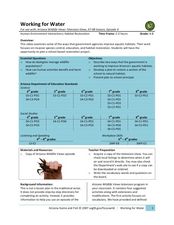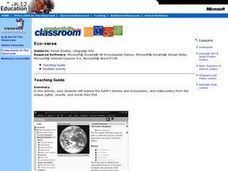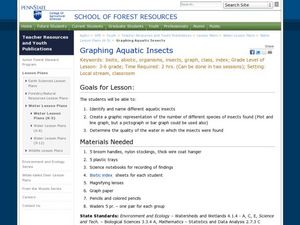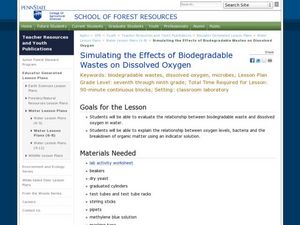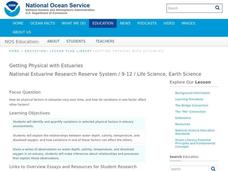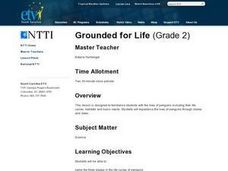Curated OER
Working for Water
Learners examine the ways that government works to help improve aquatic habitats. In this water habitats lesson students view a video and plan a school restoration project.
Curated OER
Is Urban Sprawl Causing Us To Lose More Than Ground?
Pupils map the changes that occur in the land as a result of urban sprawl. They explore the problems that paving and building have on the watershed and the habitats on the Northshore.
Curated OER
Maintaining Strong Fisheries
Pupils play a game about the life cycle of a blue crab in order to witness the causes of changes in the crab population and discuss what a resource manager could do to keep a stable crab population. Students then create a game titled...
Curated OER
Eco-Poetry
Students explore the Earth's various biomes and ecosystems using Internet research. They create a multimedia poem using the photos, sounds, and vocabulary from their research.
Curated OER
Extinct Animals Of The Louisiana Purchase
Students investigate two extinct species of birds that existed during the time of the Louisiana Purchase in Arkansas. They conduct research to describe the characteristics of the bird and look for the causes for its eventual extinction.
Curated OER
Graphing Aquatic Insects
Students identify aquatic insects. In this organism lesson, students locate aquatic insects near a local waterway and collect them. Students graph the amount of insects that they collected.
Curated OER
Fish Fact Rummy
Seventh graders study and explore the base of PA game fish species and characteristics. In this cooperative learning lesson students create a fish fact game by researching information on certain species then play it.
Curated OER
Leaf Pack Study
Students conduct an experiment using leaf packs. In this leaf lesson students complete an activity in groups and complete a handout.
Curated OER
Simulating the Effects of Biodegradable Wastes on Dissolved Oxygen
Students evaluate the relationship between biodegradable waste and dissolved oxygen in water. In this biodegradable wastes lesson students complete a lab activity in groups then analyze their results.
Curated OER
Getting Physical with Estuaries
Students study estuaries and how the physical factors change over time. In this investigative lesson students use a website to gain knowledge of estuaries then in groups they create and present their charts.
Curated OER
Birds
Young scholars list marine birds in their area and report on the threats made to these species. In this marine life lesson students compare bird count data and argue either for or against its accuracy.
Curated OER
Floods
Students investigate how hurricanes impact a stream flow. In this floods lesson students predict the impact of storms on animals and interpret data.
Curated OER
Our World A Complex Eco-system
Sixth graders set up an ecosystem, investigate conservation techniques, develop an action plan for conservation, and various other activities to explore the ecosystem.
Curated OER
Fishing gear
Students investigate he fishing gear and techniques utilized by commercial fishers in Magdalena Bay. They determine the ecological impacts of different fishing techniques.
Curated OER
Cleansing, Sparkling Koos
Students explore the importance of water conservation and investigate how plants clean water.
Curated OER
Adaptable Mandibles
Students define adaptation and highlight example of adaptation in birds and other animals. They study feeding techniques of seabirds and investigate the effect that trash has on wildlife.
Curated OER
Why Care About Amphibian Population Decline and Malformations?
Learners examine the reasons for preserving wildlife. They look at reasons for amphibian malformations and write an essay about the ethical issues that this brings up. They listen to the teacher read quotes about extinction and how the...
Curated OER
Making a Food Web and Learning About Ecosystems
Third graders examine the difference between a food web and food chain. They also examine the importance of the sun in a food web and food chain. Students understand what happens when you remove parts of the chain.
Curated OER
Roaming Biomes
Students use the Internet to research the capabilities of earth-observation satellites. Using the information, they write a report on how remote-sensing technology is used to measure the impact of climate change. They identify the...
Curated OER
Grounded for Life
Second graders become familiar with the lives of penguins including their life cycles, habitats and basic needs. Students will experience the lives of penguins through stories and video.
Curated OER
Seashore Limitations
Students demonstrate the movements and behaviors of creatures from different parts of the ocean.
Curated OER
Native Americans at Rose Bay
Learners examine the Timken Native Americans of the 1400s and their culture of hunter-gatherers. They study the necessary vocabulary using a number of activities.
Curated OER
Environmental Science/Water Pollution
Pupils study natural habitats, aquatic life, renewable and non-renewable resources. They discuss conservation efforts for sea otters and desert toad in this units.
Curated OER
The Arctic and Taiga Ecozone of Canada
Students discover the differences in the Arctic and Taiga regions of Canada. They identify physical and human characteristics of both region. They also practice using an atlas.


